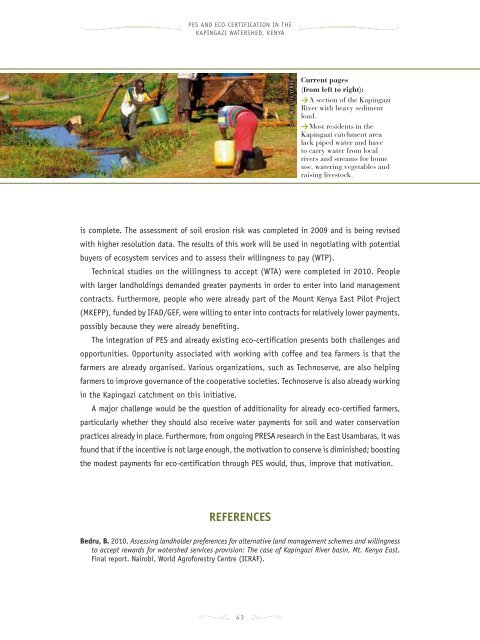agriculture and ecosystem services - Serena
agriculture and ecosystem services - Serena
agriculture and ecosystem services - Serena
Create successful ePaper yourself
Turn your PDF publications into a flip-book with our unique Google optimized e-Paper software.
PES <strong>and</strong> Eco-certification in theKapingazi watershed, KenyaS. Wachira/ICRAF't .1.:;;4Y,Adk.. " ._404._IAL.....,..©Current pages(from left to right):>A > section of the KapingaziRiver with heavy sedimentload.©>Most > residents in theKapingazi catchment arealack piped water <strong>and</strong> haveto carry water from localrivers <strong>and</strong> streams for homeuse, watering vegetables <strong>and</strong>raising livestock.is complete. The assessment of soil erosion risk was completed in 2009 <strong>and</strong> is being revisedwith higher resolution data. The results of this work will be used in negotiating with potentialbuyers of <strong>ecosystem</strong> <strong>services</strong> <strong>and</strong> to assess their willingness to pay (WTP).Technical studies on the willingness to accept (WTA) were completed in 2010. Peoplewith larger l<strong>and</strong>holdings dem<strong>and</strong>ed greater payments in order to enter into l<strong>and</strong> managementcontracts. Furthermore, people who were already part of the Mount Kenya East Pilot Project(MKEPP), funded by IFAD/GEF, were willing to enter into contracts for relatively lower payments,possibly because they were already benefiting.The integration of PES <strong>and</strong> already existing eco-certification presents both challenges <strong>and</strong>opportunities. Opportunity associated with working with coffee <strong>and</strong> tea farmers is that thefarmers are already organised. Various organizations, such as Technoserve, are also helpingfarmers to improve governance of the cooperative societies. Technoserve is also already workingin the Kapingazi catchment on this initiative.A major challenge would be the question of additionality for already eco-certified farmers,particularly whether they should also receive water payments for soil <strong>and</strong> water conservationpractices already in place. Furthermore, from ongoing PRESA research in the East Usambaras, it wasfound that if the incentive is not large enough, the motivation to conserve is diminished; boostingthe modest payments for eco-certification through PES would, thus, improve that motivation.ReferencesBedru, B. 2010. Assessing l<strong>and</strong>holder preferences for alternative l<strong>and</strong> management schemes <strong>and</strong> willingnessto accept rewards for watershed <strong>services</strong> provision: The case of Kapingazi River basin, Mt. Kenya East.Final report. Nairobi, World Agroforestry Centre (ICRAF).43


